Tuesday, July 14: Surprise Witness
When ELLERY QUEEN met NBC
 by Dale Andrews
by Dale Andrews
Please welcome back our good friend Dale Andrews, the latest avatar of a certain well-known detective. —JLW
Satire, it is said, closes on Saturday nights. In an article published some years back in the San Francisco Weekly reflecting on the spotty career of satirist Tom Lehrer, Jack Boulware offered the following explanation of the truth underlying the cliché: “satire never makes any money and people don’t understand it.”
Writers of mystery short stories can fully sympathize with at least the first part of that explanation – like the satirist there may be many reasons for short story writers to practice their art, but one of them is certainly not money. But a truer corollary to satire’s epitaph is the fate of the televised mystery short story. A smartly written television mystery series, particularly a whodunit, rarely lasts more than a season. And forget about anthologies – other than Alfred Hitchcock and The Twilight Zone they invariably cave in a few weeks. The success of classical mysteries on the airwaves it has been observed, like the success of satire, is directly and inversely correlated to the intellectual effort demanded from the viewers.
I know, I know. You will point to the many CSIs and Law and Orders that seem to grind on forever. Or you will remind me that “Murder She Wrote” lasted for 12 seasons. But comparing classic mysteries, particularly “fair play” intellectual brain-teasers, to those admittedly successful series is, I would posit, like comparing Milton Berle to Tom Lehrer. It is not Burlesque that closes in a week – it’s satire.
Two paragraphs back I was tempted to state that smartly written television mysteries rarely last more than 13 weeks, but that would have been historically at least a bit unfair. One of the finest whodunits ever developed for television in fact lasted a full season.
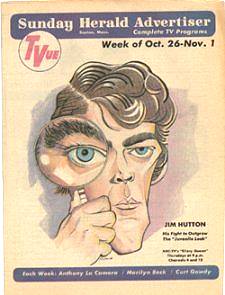
Ellery Queen
NBC’s 1975-1976 Ellery Queen series was developed for television by Richard Levinson and William Link, of Columbo fame. They approached the series with both a love and an understanding of the Queen oeuvre. Earlier Queen movies and television series simply could not get the tone right. They tended to lessen the intricacy of the Queen plots while at the same time re-inventing Ellery into a humorous or even slapstick foil. An earlier NBC pilot for an Ellery Queen series surrealistically and disastrously handed over Ellery’s role to Peter Lawford, who played him as a “mod” Brit. But in NBC’s 1975-1976 Ellery Queen series, amazingly, everything clicked. The result was a series that was true to the literary Queen and that delivered wonderful “fair play” mysteries to viewers every week.
Levinson and Link, by all accounts lifelong Queen fans, were given free hand by NBC to do Ellery Queen the way they wanted. The producers anchored the series in 1947 and set a stylistic tone in keeping with the Queen works of the 1940s. The late Jim Hutton captured Ellery as a good-natured, absent-minded young man – a character who more neatly matched the Ellery of the 1940s (as contrasted to the pince-nez dandy from the earlier Queen volumes). 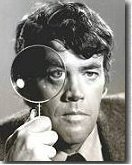
While the absent minded nature of Ellery was in many respects itself re-invention, it was re-invention that worked because it did not stray impermissibly from the original. In an earlier article on pastiches I offered the following rule that I apply when utilizing a character created by others – like the physician, I “try first to do no harm.” There are leeways that can be taken with an existing character, but at the end of the story the character must remain recognizable. The befuddled and clumsy Ellery of the movies failed because the character was played too broadly – Ellery was transformed into a burlesque of the original. But, by contrast, the absent minded Ellery created by Mr. Hutton, and as envisioned by Levinson and Link, rang true.
In the 11 October 1975 issue of TV Guide, published the week that the NBC series premiered, Rand Lee, one of Manfred B. Lee’s sons, made precisely this point:
In many ways, Ellery is a lot like his creators. The NBC Ellery Queen pilot film captured the "authentic" Ellery nearly as he has ever been captured; after watching that film . . . Cousin Fred [Dannay] remarked it was like seeing himself as a young man. Had Dad lived to see the pilot (he died in 1971 of a heart attack), he might have said the same thing about himself. One can imagine the NBC Ellery being cornered at a party by an enthusiastic fan and falling asleep in his chair while she gushes at him; chopping up redwood patio furniture to use in building bird cages; finally succumbing to the charms of some pretty girl but forgetting to formally propose to her until their wedding day. My father actually did all those things.
So, too, the show captured the Inspector, even though it dropped the “Old Man’s” trademark mustache. Hutton’s charm and natural manner played perfectly against David Wayne’s crusty Richard Queen, and a more perfect Sergeant Velie than that delivered by Tom Reese is hard to imagine.
But while each of these ingredients was necessary to the show’s critical (if not commercial) success, it was the caliber of the whodunit mysteries that were the hallmark of the series. Though the episodes varied in quality, each was ultimately redeemed by its plot, the production values, and the marvelous cast. The stories were also perhaps the best televised approach to classic “fair play” detective short stories ever brought to the television screen. All of the clues were meticulously displayed for the viewer – the camera, in fact, would often focus in on the critical clue for a long moment, daring us to figure out its significance – and when Ellery invariably turned to the screen three-quarters of the way through each episode to offer up his “challenge to the reader” we had only ourselves to blame if (when!) we still could not decipher the truth that Mr. Queen had just gleaned.
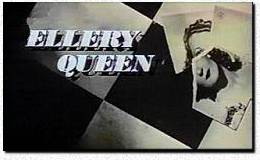 So why did this erudite, stylistic and highly praised series last but one year? Hearkening back to the beginning of this discussion, I think it is the same reason that satire closes in a week. The show was, too good, it demanded more than the television audience was willing to commit.
So why did this erudite, stylistic and highly praised series last but one year? Hearkening back to the beginning of this discussion, I think it is the same reason that satire closes in a week. The show was, too good, it demanded more than the television audience was willing to commit.
In a 2002 article”Confessions of a Mystery Writer " William Link concluded as much. " Thinking back,” he wrote, “the Queen series was too complicated for its own good. I remember spending an entire afternoon with Dick [Levinson] trying to figure how keys on a keychain would fall into what configuration in one’s pocket when placed there. " When audiences didn’t respond the lesson was learned: " [o]ur failure with Ellery Queen was our template” for future efforts, Levinson observed.
We deliberately made the clues on M urder She Wrote easier to decipher, including a very guessable murderer now and then. Part of our psychology was to reward the focused viewers because they might then be motivated to return the following week. Another unexpressed reason was that it was far easier to come up with facile clues than sweating bullets over keys in a pocket… The upshot was that ‘Murder She Wrote‘ thrived for 12 seasons, Ellery Queen [only] one.
In short, the Queen show simply refused to write to a least common denominator. Like good satire, which closes on Saturday night, that ultimately proved its undoing. 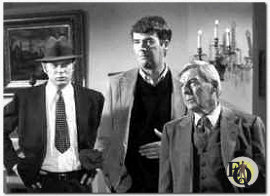
Short of catching an errant re-run of Ellery Queen, the series, like much of Queen’s written work, is now largely unavailable. Like other well-done series ( The Defenders springs to mind) the 1975 Queen series has become a lost treasure. It has never been officially re-issued in DVD format (although lower quality recordings can be found on line). The fine web site Ellery Queen Show is devoted totally to the series and Kurt Sercu’s always excellent and encyclopedically annotated web site Ellery Queen, a Website on Deduction also has detailed information concerning the series and each of its episodes. But otherwise the NBC series is largely forgotten.
We mystery short story writers are a tough lot, though. We toil hard for very little, we don’t give up easily; we are used to tilting at windmills and looking for story ideas where we can find them. One, and only one, of the episodes of Ellery Queen was actually based on a Queen story – The Adventure of the Mad Tea Party, which aired on October 30, 1975. That episode has been recognized as perhaps the best screen treatment ever of a Queen story. What if Ellery had been called to Hollywood as a consultant on that episode? And what if something went terribly wrong during the filming? That got me to thinking.
My next Ellery Queen pastiche, The Mad Hatter’s Riddle, set in Hollywood in the fall of 1975, appears in the September/October edition of Ellery Queen Mystery Magazine, which will be out later this month. I hope you enjoy it.
Kurt Sercu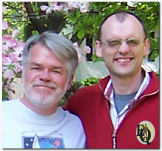
This article has drawn extensively from material collected and compiled by Kurt Sercu, my sometimes-collaborator, good friend, and the webmaster of the aforementioned Ellery Queen web site. The clip art is from Kurt’s website. Kurt also recently uncovered a link to an NBC promotional film introducing the entire 1975 NBC lineup. It’s available here and if you “fast forward for about 16 minutes you can see the promotional introduction of Ellery Queen.
There is no better way for mystery fans to spend a rainy afternoon than by exploring the labyrinthine corridors of Ellery Queen – A Website on Deduction




















I adored Jim Hutton as Ellery Queen. I think the reason Columbo was so popular was partly due to the audience knowing who the bad guy was up front — and Peter Falk’s performance was key, too.
Dale casually dropped the name ‘Tom Lehrer’ who is a long-time favorite of mine. I added a link to a web site that declaimed "The most brilliant creative genius that America has produced in almost 200 years," only a slight exaggeration. If you were a little older or a little younger, Tom Lehrer may have escaped your attention. I was fortunate enough to have friends with siblings in college.
Lehrer graduated from Harvard at age 18 and earned his master’s the following year in mathematics. He’s been a professor at MIT, Harvard, Wellesley, and UCSC.
But he also developed a second career as a songwriter and performer specializing in social satire. Lehrer had a lot of fun with math, science, the environment, and even religion with his songs about The Elements, New Math, Pollution, and a catchy favorite, The Vatican Rag.
He also served as a social conscience. After World War II, American embraced the nazi scientist Wernher von Braun who became the glowing hero of our space program. Lehrer reminded us of von Braun’s origins with his biting song titled Wernher von Braun.
(above links are YouTube)
Great article, Dale, and I look forward to that next pastiche eagerly. Over the years, I’ve suggested many reasons for the eclipse of EQ, but the biggest one is probably the general dumbing down of contemporary culture, reflected in the decision Levinson and Link had to make after the failure of the EQ TV series. Their earlier series, Columbo, had the same kind of appeal to the intellect as the EQ series, though in the form of inverted detection as pioneered by R. Austin Freeman rather than the whodunit. The comparison to Tom Lehrer is interesting. (Back in the ’50s, a highlight of a local L.A. TV talk show was the host’s angelic looking sidekick doing a deadpan rendition of the mock Irish ballad, “Rickety-tickety-tin,” in which a young girl murders her whole family by various means.) Lehrer, of course, was never a mass culture success as Ellery Queen once was, but consider the case of Fred Allen, a brilliant satirist and wit whose literate humor was part of mainstream network radio in the 1930s and 1940s. Today, if he managed to get on the air at all, it would be NPR or nothing. Don’t get me started, but I guess you already did.
Television has played an important role in the dumbing down of society in that it eliminated the need to use imagination. Listening to a program on radio was similar to reading in that the audience had to visualize the characters and the setting. Television does it all for you. Rarely is there a need to use imagination or even think. That isn’t to say there has not been some excellent programs, including EQ. Watching Jim Hutton was pure pleasure. Today the show would likely be cancelled in mid season. Only PBS seems to care about quality.
There were two factors, neither having to do with quality, that worked against Ellery Queen in 1975.
(1) The show’s original timeslot was Thursday at ( (8 central), opposite CBS’s movie and ABC’s Streets Of San Francisco, then in its fourth season and at its peak of popularity. NBC subseuently moved EQ to Sunday at 8 (7 central), and saw its ratings against Cher’s faltering variety hour on CBS (ABC’s Six Million Dollar Manusually won the hour, but EQ managed a 30 share, which was a passing grade in those pre-cable days). What happened then? Some genius at CBS decided to reconcile Cher with her ex-husband Sonny on-air. The result was (you should excuse the expression) a nine-day wonder, and for EQ, they were the nine days that determined the show’s fate. ABC’s bionic guy was unaffected, but S&C got the curiosity crowd, and EQ went down. I have never forgiven Cher.
(2) The following is just a guess on my part: one of the raps some critics have taken at the EQ show was Jim Hutton’s “lack of energy”(or “apathy”, “lethargy”, or “indifference”). I’ve always suspected that this might have been attributed to the early onset of Hutton’s eventually fatal cancer, which claimed his life in what would have been the show’s fourth season. I can’t say for certain, but it is a fact that Hutton’s post-EQ work is scarce, and cancer can take an awfully long time to kill you.
I say these things as a sort of defense: I don’t think tha the EQ show was over anybody’s head – and there are more than a few folks here in Chicago who feel the same way when they watch the reruns on Sunday afternoons on MEtoo tv.
You make many good points about that wonderfull EQ TV series. Nowadays the only thing close (other than the great British stuff on PBS) is the MONK series. The quality of the plots varies wildly and the occassional overemphasis on comedy does grate but, overall the 7 or so seasons it’s been on have been a joy—fair-play, itellectual cluing can be found in many of the episodes. The creators and writers are knowledgable of Sherlock Holmes, Columbo and classic mysty plots.
Believe it or not, Dale, I got home about 2 hours ago, checked my mailbox and just finished reading “The Mad Hatter’s Riddle” in the latest EQMM! Loved every second of it! As a High School kid in the ’70’s, I didn’t give a darn about the “fair-play-challenge-crud.” Or mysteries in general. (That came much later!) What I loved was the period detail. I soaked it all in as entertainment. (I grew up on stories of my folks who were growing up in the 1940’s.) Dale, the music in my head as I read your story was Bernstein’s, the voice of Queen’s, Mr. Hutton. (Would that he could have lived to play Ellery today!)
I close with a brief clip of the intro to the EQ episode The Mad Hatter’s Riddle: “This actor’s comeback has gone down the rabbit hole. Who killed him? Match wits with Dale Andrews and see if YOU can guess who-dunnit!”
Excellent article. Thanks Dale! It brought back fond memories. I used to tape record episodes so I could listen to them over and again (before video).
Hello, all
Sorry to have been absent during all of this great discussion — I was on a train yesterday travelling from D.C. to Montreal — on today to Halifax. So I read a few comments on my cell phone browser but a post had to await a hotel connection.
As to Tom Lehrer, as you might suspect I am a fan. I can (and to the horror of many do) at times launch into impromptu renditions of his songs.
As to Queen (“the mainstream of tonight’s symposium” as Lehrer would say)– wow; what great memories all of your observations bring back.
When Mike reads “The Mad Hatter’s Riddle,” which I hope he does, he will find, as has Jeff already, a prescience to his discussion on the Six Million Dollar Man and, more importantly Sonny and Cher, who in minor respects are referred to in the story.
Dale: You hope I read the story?We’ve all come this far together, and you even think I might miss it? Counting down the days, my friend…
Meanwhile, would you indulge me in a bit of fantasy?
Whenever I become fond of a TV series, I like to “become the producer” – in my mind, of course. Ellery Queen was a natural for me, as I’d been reading the books and the magazine since high school. When it still looked like EQ might get a second season, I had a whole slew of great ideas ( I thought so, anyway). Do you think any of these might have worked?
(1) I would have added Nikki Porter to the cast. Not necessarily every week; maybe in a loose rotation with Simon Brimmer and Frank Flannigan. Universal still had a contract list in 1976, and there were more than a few actresses on hand who could have done Nikki to a turn (unless I’m mistaken, one such actress was Melodie Johnson…).
(2) I would have made an effort to use more actual EQ stories as bases for scripts. Maybe not the big novels – those would be too layered for weekly TV to do right – but the novellas and shorts could be adapted with proper attention to detail. It was always obvious that the EQ staff writers loved the source material and were eager to do right by it.
(3) Since stunt-casting is a necessary ingredient of this kind of series, I would go all out, as with this ultimate EQ fantasy:
A two-hour special season premiere featuring as guest stars every actor who ever played Ellery in any medium and who was still alive in 1976.I just checked IMDb, and the only ones who weren’t were Donald Cook and Richard Hart. Just think of the photo ops: Jim Hutton and David Wayne with the Movie Ellerys(we’ll be nice and include Eddie Quillan), with the TV Ellerys (we’ll be forgiving and include Peter Lawford), with the Radio Ellerys (we’ll be indulgent and include Bill Owen). Also include whatever supporting players from all media, like Charles Lane and Santos Ortega. And I know I’m stretching this fantasy to the breaking point but how about this: we somehow talk Frederic Dannay himself into making a cameo appearance.
Afterwards we throw a big party with everyone in attendance – maybe get on Entertainment Tonight or score a spread in People? And maybe have someone go around taping reminiscences from the guests (who knows, somebody might invent the DVD)…
OK, I’ve gone hog-wild here – but what good’s a fantasy if you don’t go all the way?
(In the meantime, should any of you happen to discover the secret of time travel, be sure and let me know…)
The dream EQ show Mike describes sounds great. I think the hardest part would have been getting Fred Dannay to appear, but maybe not.
This comes to you from the lobby of the Fairmont Hotel in Montreal as we wait to leave for Halifax on our 6:30 train.
The “guest star” ideas are interesting. While working on The Book Case Kurt had an idea of using names of actors who had previously appeared in Ellery Queen movies as characters in the story. I ultimately couldn’t get into the idea since my preferred approach is to make the story as real as possible — a pastiche, not a parody. I like to think of Ellery like the Baker Street Irregulasr think of Holmes — as though he really existed.
But speaking of guest stars, even some bit parts in thed NBC series were filled with former stars. The taxi driver in The Mad Tea Party episode — who doesn’t even have a line — is one of the old Bowery Boys. The only reason I know this is that Kurt purchases the script he used (one wonders why he needed one) last year on Ebay and since Ebay doesn’t allow bidders with addresses in Europe I had to middle-man the transaction!
Kurt’s website also reports that at least one script intended for the second season of EQ was re-tuned as a Murder She Wrote episode — it is introduced by Jessica but involves a young detective and his father who solve a murder mystery on a cruise.
Hello again…
The EQ leftover episode that morphed into Murder She Wrote can be found in the 6th season DVD set. The Ellery character is played by Gary Kroeger (late Saturday Night Live) and the Inspector is John Karlen (Cagney & Lacey. Also Robert Vaughn plays a pompous radio sleuth. Does it bug you as it does me that this second-hand episode is more readily available than the genuine article? Take what you can get, I guess…
I’ll see if I can find more to add on here tomorrow.
As I didn’t comment earlier, I agree with Mike that the EQ series might profitably have adapted more of the Queen short stories. I wonder why they didn’t. In the early live TV series with Richard Hart, who made a better Ellery than most, one episode that has survived via kinescope is based on “The Hanging Acrobat.” While the main clue from the story is used (sort of), the producers went more for action than cerebration. (It’s a bit unsettling to see all the physical stuff Hart was doing and knowing he would suddenly drop dead within a few weeks.) The episode is included (and the quality isn’t bad, considering) in a bargain 12-DVD set called “Best of TV Detectives” from Mill Creek Entertainment. That’s the only Ellery in the set, but many other early series are represented by multiple episodes.
That Richard Hart EQ show was one of the first vintage TV shows I ever got on VHS. I added as many others as became available in the Collector’s market. Most of these were kinescopes with Lee Bowman and Florenz Ames; a couple have the original commercials for Kaiser-Frazer cars, delivered by John Larkin or Rex Marshall. I’ve also got a couple of the film shows with Hugh Marlowe (one has the” Mystery Is My Business” title). Astonishingly (to me, anyway), none of the 1958 live-tape series with Nader or Philips seems to have survived (unless someone in NBC middle-management had the presence of mind to steal some kinescopes). It’s truly frustrating to know how little of EQ in other media still exists, particularly in light of the character’s wide presence in all media. At this point, I’ll even settle for a good copy of the Peter Lawford pilot – just for completion purposes, you understand.